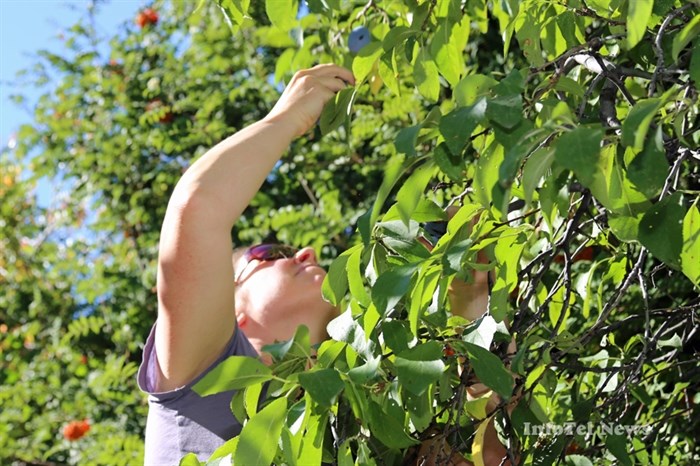
(JENNIFER STAHN / iNFOnews.ca)
April 08, 2020 - 6:00 PM
As thousands of temporary foreign workers are anticipated to return to the Okanagan, the question in the orchards and farms is how to house and care for them under a global pandemic.
David Geen is the owner of Coral Beach Farms and brings in hundreds of such workers each season, housing them in Kelowna, Lake Country and Vernon. Because of COVID-19, he knows they will have to be quarantined for 14 days.
The rules of how and where that happens have not yet been set but Geen is hoping they will all be tested for COVID-19 to make sure they are free of the virus.
Once out of quarantine, he suggests they stay on the farm, have groceries brought to them and that they don’t go out into the community. That way, they don’t get infected and bring it back to their coworkers. On the flip side, if they do subsequently get the virus from domestic sources, they won't take it back out into the community.
“We’ve had this discussion with our guys,” Geen told iNFOnews.ca. “It’s disappointing to them. They like to, now and then, go buy groceries. They go to a buffet Chinese restaurant. It’s kind of their social day. But when they realise, ‘oh, if I get sick and I can’t work for 14 days and anybody in the dorm with me can’t work for 14 days, that’s not a very good thing.’ They’ve heard on Facebook about what’s happening over at Bylands and that’s a sobering thing as well."
Geen's suggestion will be considered by many farmers, particularly after including 63 temporary foreign workers hired by Bylands Nurseries were forced into quarantine after at least 19 tested positive for COVID-19.
Not everyone is convinced Geen's approach is best.
“I think that’s a really terrible idea,” Amy Cohen a volunteer organizer with Radical Action with Migrants in Agriculture, which advocates for temporary foreign workers, told iNFOnews.ca. “This is a group of workers that is already isolated at the best of times and, what that means, is that oftentimes people aren’t treated for health issues that they have.”
Cohen is also a professor of anthropology at Okanagan College and a researcher with expertise in migrant workers, their conditions and access to services like medical care.
“We really need workers to be able to access the community and, especially, public health directly without having their employer being the mediator,” she said. “We already know that they’re often reticent to report health issues to their employer because they fear losing their job.”
Another problem is that, while they have to buy their own private health insurance, they often have to pay medical expenses up front then claim it back from the insurance company. That can take weeks and may contribute to them being unwilling to seek medical attention.
Part of the issue for workers is that they may not get paid while in quarantine.
It’s likely going to be up to each individual grower how that’s handled. Most workers expect to get some money soon after arriving, not only for their own expenses but to send home to their families as well, Geen said.
One option is that they get paid while in their initial quarantine then that money be repaid gradually over a number of pay periods. For long time workers – Geen has some who have worked for him for more than a decade – he might pay them a partial wage while in quarantine.
Both the growers and workers will be highly motivated to make sure they don’t get sick with COVID-19, Geen said. If they could all be tested, it would be known for sure they are all free of the virus. It would only be the local workers might carry the virus from the community back to the farm.
Growers are still waiting for the province to set the rules before any more temporary foreign workers are brought in.
“I’ve been getting a lot of calls and a lot of texts from workers in Mexico who are terrified to come here (because of COVID-19),” Cohen said. “They know what their conditions were – people who had been coming for many years – and they’re really scared. Even though they absolutely depend on the income they earn here, a lot of them are not going to come because they don’t feel they’re going to be taken care of.”
There are currently about 2,500 COVID-19 diagnosed cases in Mexico versus almost 18,000 in Canada. Mexico has more than three times the population of Canada (about 130 million).
To contact a reporter for this story, email Rob Munro or call 250-808-0143 or email the editor. You can also submit photos, videos or news tips to the newsroom and be entered to win a monthly prize draw.
We welcome your comments and opinions on our stories but play nice. We won't censor or delete comments unless they contain off-topic statements or links, unnecessary vulgarity, false facts, spam or obviously fake profiles. If you have any concerns about what you see in comments, email the editor in the link above.
News from © iNFOnews, 2020